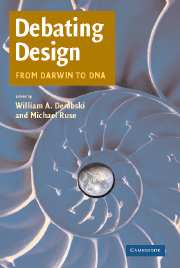5 - The Flagellum Unspun
The Collapse of “Irreducible Complexity”
Published online by Cambridge University Press: 05 June 2012
Summary
Almost from the moment On the Origin of Species was published in 1859, the opponents of evolution have fought a long, losing battle against their Darwinian foes. Today, like a prizefighter in the late rounds losing badly on points, they've placed their hopes on one big punch – a single claim that might smash through the overwhelming weight of scientific evidence to bring Darwin to the canvas once and for all. Their name for this virtual roundhouse right is “Intelligent Design.”
In the last several years, the Intelligent Design (ID) movement has attempted to move against the standards of science education in several American states, most famously in Kansas and Ohio (Holden 1999; Gura 2002). The principal claim made by adherents of this view is that they can detect the presence of “Intelligent Design” in complex biological systems. As evidence, they cite a number of specific examples, including the vertebrate blood clotting cascade, the eukaryotic cilium, and most notably, the eubacterial flagellum (Behe 1996a; Behe 2002).
Of all these examples, the flagellum has been presented so often as a counterexample to evolution that it might well be considered the “poster child” of the modern anti-evolution movement. Variations of its image (Figure 5.1) now appear on web pages of anti-evolution groups such as the Discovery Institute, and on the covers of “Intelligent Design” books such as William Dembski's No Free Lunch (Dembski 2002a).
Information
- Type
- Chapter
- Information
- Debating DesignFrom Darwin to DNA, pp. 81 - 97Publisher: Cambridge University PressPrint publication year: 2004
References
Accessibility standard: Unknown
Why this information is here
This section outlines the accessibility features of this content - including support for screen readers, full keyboard navigation and high-contrast display options. This may not be relevant for you.Accessibility Information
- 13
- Cited by
